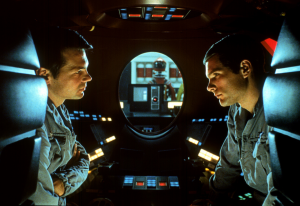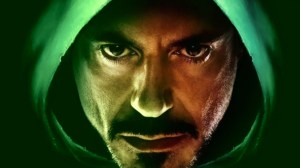With news that Henry Cavill is about to launch a Warhammer 40K Cinematic Universe on Prime Video, many people are asking the very valid and important question “What the heck is Warhammer 40K?” The popular British science-fiction franchise is one of the biggest IPs in the world that hasn’t had a serious movie or TV adaptation, in part because of its satirically dark themes and its complex and singular canon that stretches over 30 years, nine game editions, and thousands of novels. It’s going to be hard to adapt Warhammer 40K into a live-action franchise, in part because it has lurked just outside of the periphery of mainstream fandom for generations.
Videos by ComicBook.com
Warhammer 40K – Where to Start?
At its heart, Warhammer 40,000 is a miniatures skirmish game in which players build armies from a single faction and then fight against each other. Battles take place on a tabletop filled with terrain, with players using tape measures to determine how far their units can move and six-sided dice to determine whether or not their units’ abilities and attacks hit the opposing side. Depending on the size of the army, players will usually spend a couple hundred dollars to build a basic army, with players assembling and painting individual miniatures from kits they buy at hobby stores.
Behind the miniatures skirmish game is a rich universe created in the 1980s by a team at Games Workshop, who were looking to create a science-fiction version of their Warhammer Fantasy game. Many classic fantasy species like orcs, elves, and dwarves appear in Warhammer 40K, with magic and psychic powers as important to the setting as space ships and laser beams. There are numerous factions and armies in Warhammer 40K, and all are willing to wage war against each other with no provocation.
Warhammer 40K – Who Are The Good Guys?
The world of Warhammer 40K is a pessimistic and deliberately grimdark one, to the point of irony. The Imperium of Man is xenophobic and imperialistic and simultaneously paralyzed by bureaucracy. Its leader, the Emperor of Man, is a living corpse kept inside a supercomputer to help guide spacecrafts through the treacherous Warp that allows for interstellar travel. Over 1,000 souls are fed to the Emperor a day to keep his psychic powers active and entire space systems have their resources stripped to feed the war effort. The Imperium’s greatest soldiers are Space Marines, augmented humans who worship the Emperor as both their progenitor and god. Wielding chainsaw blades and bolt guns, the Space Marines are the most recognizable type of troop in Warhammer 40K, although they are split into different Chapters which have different functions and abilities.
The Imperium is beset by a number of threats, including Legions of former Space Marines who were corrupted by the arcane magicks of Chaos. During a civil war known as the Horus Heresy that occurred about 10,000 years prior to the current era of the game, about half of the Space Marines turned against the Imperium and started to worship the gods of Chaos, malevolent beings from the Warp. While the Imperium emerged victorious from the Horus Heresy, the Emperor of Mankind was fatally wounded during the final confrontation and forced into his current undead form. Meanwhile, the Chaos Space Marines still lurk and wage war against the Imperium on the fringes of their territory. They are joined by other Chaos Demons and cultists that worship ancient Chaos Gods like Khorne, Nurgle, or Slaanesh. Keep in mind that in the Warhammer 40K universe, there are no “good” gods – every god that remains in the distant future is a god of war, death, guile, or worse.
Warhammer 40K – Other Factions and the Black Library
Other notable factions include the undead robotic Necrons, an ancient race that emerged from hidden Tomb Worlds with the sole purpose of conquering the universe, the Orks, a populous species dedicated to the Great WAAAGH! (their word for War) who is able to cobble together bits of technology into usable tools and weapons that should otherwise be impossible, and the Tyranids, an insectoid species of Apex Predators who seek only to consume. Each faction is nihilistic and devoid of positive traits as the last, meaning that many players and fans lean into the grimdark of the setting.
While there are no “good” factions in Warhammer 40K, there are plenty of heroes and anti-heroes depicted in numerous novels and short stories. There’s too many novels in the Black Library (Games Workshop’s publishing line) to recommend just one, but we recommend looking to the Eisenhorn (an Inquisitor who travels from world to world, often rooting out threats from a specific Chaos Demon) or Ciaphas Cain (a brilliant strategist who attempted to avoid combat as much as possible, in stark contrast to his Imperium peers) novel series if you want to get a flavor for what the Warhammer 40K line has to offer. If Amazon Studios is adapting existing stories for their Warhammer 40K Cinematic Universe, we’d guess that one of these series are near the top of their pile for consideration.
The Warhammer 40K universe is a rich one, although you’ll have to come to terms with the incessant grim darkness to fully appreciate it. Some folks are put off by the lack of “good” in the Warhammer 40K universe, but others seem to enjoy the irony and grim warnings about the flaws of every facet of society that it brings. The major question is how Amazon will capture both the depth and the self-awareness of the grim darkness of the far flung future, and whether a mainstream audience will be able to enjoy a universe where only war exists.








